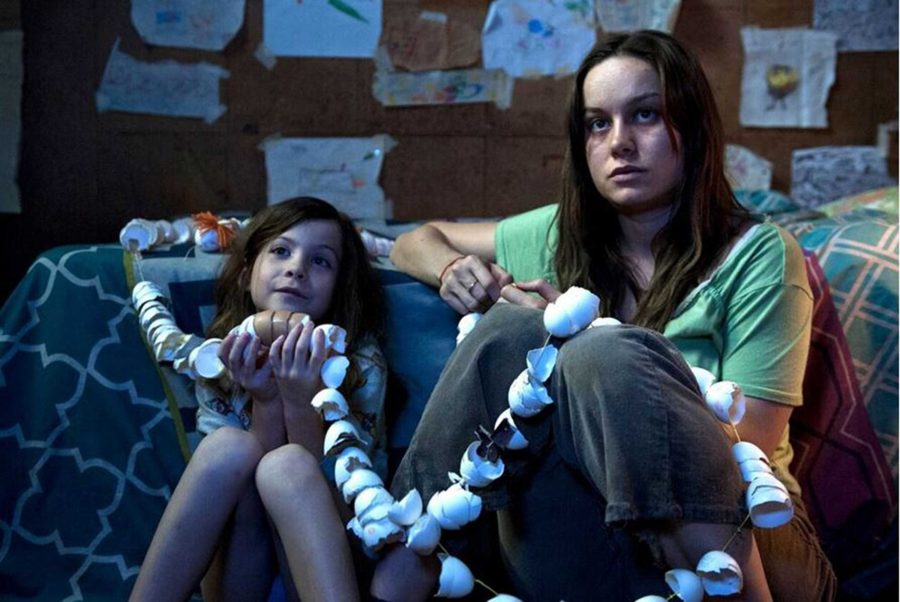“Room”
Directed by: Lenny Abrahamson
Starring: Brie Larson, Joan Allen, Jacob Tremblay
Grade: A
Some films try to make you see the world in a new way, while “Room” makes you feel like you’re seeing the world for the first time. Indie director Lenny Abrahamson (“Frank”) plunges face-first into the pain of desperation, the euphoria of liberation and the strangeness of discovery through the eyes of a child, essentially redefining the term “emotional rollercoaster.”
Loosely based on real events of a woman who emerged from 24 years of captivity in Amstetten, Austria, in 2008, the story follows Joy Newsome (Brie Larson) and her five-year-old son Jack (Jacob Tremblay) during and after their imprisonment in a shed by Old Nick (Sean Bridgers). Nick, who is Jack’s father, has kept Joy in confinement for seven years, repeatedly sexually assaulting her since age 17.
In order to explain their predicament in child-like terms, Joy has told Jack that Room is all of existence. Once she discovers that Old Nick is out of a job, potentially forcing him to release Joy and Jack out of financial necessity, she tells Jack the truth, beginning the first step of their escape. Instead of a happy ending, their eventual freedom only poses more challenges, such as Joy’s reconnection with her family and Jack’s incredibly rare psychological journey — ripped from imposed ignorance of Room and thrust into the world at large.
While the juvenile point of view lends itself to an optimistic tone, “Room” deals more with the consequences of escape, as seen by Joy’s intense post-traumatic stress disorder, than it is of confinement itself.
“Room” is undeniably powerful, a near-transcendental experience brimming with feeling and wonder. Adapted from Emma Donoghue’s harrowing drama of the same name, and seen from Jack’s unfettered, innocent eyes, it is both emphatically hopeful and emotionally devastating.
Like the novel, “Room” is all from Jack’s perspective. The audience is kept in the dark during the more sickly moments of their situation, such as Old Nick’s sexual abuse of Joy, and the humdrum of quotidian life that is made alien and astounding when seen from an unsullied perspective. In this way, the story avoids any pathos-tugging or relentlessly bleak melodrama.
But for all of the narrative’s wise moves, the performances are the film’s firmest asset. Larson’s work is superb. So much of the film’s overwhelming power hinges on her remarkably nuanced and believable acting, and her commitment ensures nothing of the dramatic heft is lost.
The nine-year-old Tremblay, though nearly overshadowed by Larson, is equally commendable, a truly sympathetic central character. Jack’s various encounters with the undiscovered outside world, such as dogs and other children, are portrayed with comfortable ease. Like the rest of the tactfully arranged picture, Abrahamson never exploits Jack’s frailty and cuteness for tear-jerks or schmaltz.
That isn’t to say that this film isn’t tremendously heartrending — it gave me glassy eyes and a runny nose long before I anticipated — yet there are few obvious music swells or inserted insights that beckon you to grab a tissue. “Room” is beautifully restrained and marvelously gripping, achieved, paradoxically, through the number of punches it pulls.
After Joy dupes Nick into removing Jack from Room, thinking he has died, their reunion scene outside the shed is a testament to Larson’s fervor as an actress as well as a bracing release of the first act’s quietly mounted tension of uncertainty and sexual violence.
Though most definitely a drama, “Room” is at times a nerve-twisting thriller, a candid investigation of existence and morality and a classic tale of strife surmounted that will undoubtedly receive Oscar buzz. And Jack’s underlying trip from obliviousness to truth bears all the mind-bending philosophical implications of Plato’s Allegory of the Cave.
“Room” in its totality is gracefully scripted and inhabited, devastatingly emotional and nothing less than cathartic.


